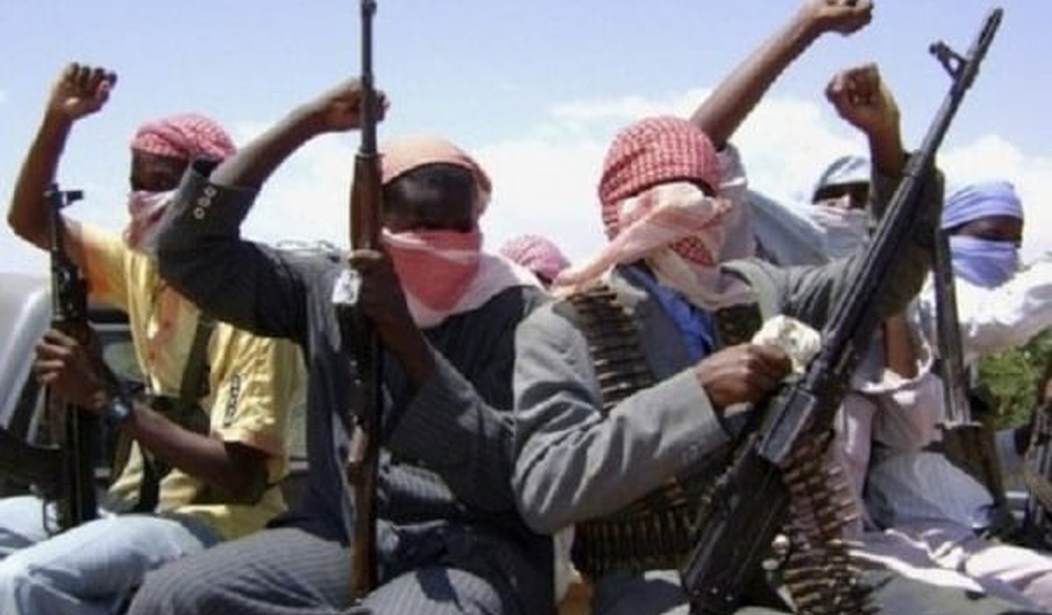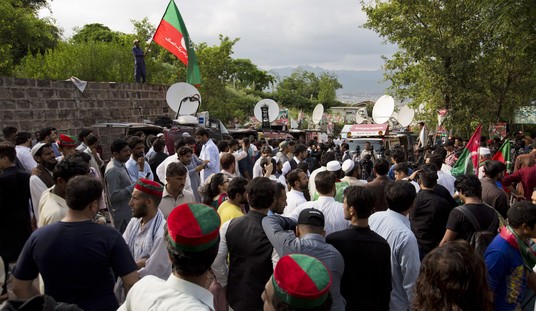WASHINGTON — As quickly as Boko Haram caught Washington by hashtag storm, the Nigerian terrorists — and their schoolgirl captives — have seemingly vanished from the radar of priorities, even as the al-Qaeda-linked group’s jihadi brothers-in-arms run roughshod across Iraq.
One senator this week, though, charged that the administration never wanted the frightening growth of the North African terrorist organization to receive much attention in the first place.
A month ago, first lady Michelle Obama posed for a Twitter shot with a white placard bearing the #BringBackOurGirls hashtag. The following week, President Obama deployed several dozen U.S. personnel to Chad to help in the hunt for more than 200 girls missing after being abducted from the Government Secondary School in Chibok.
It’s been nearly two months since the April 15 kidnapping, and former Nigerian President Olusegun Obasanjo grimly warned Thursday that the search for the girls is rapidly approaching a lost cause.
“It’s inconceivable to get all of them back. If you get all of them back, I will consider it a near-miracle,” Obasanjo told the Premium Times newspaper. “Do you think they will hold all of them together up till now? The logistics for them to do that, holding over 200 girls together, is too much.”
The ball was dropped by President Goodluck Jonathan not responding quickly to the terrorists, he added. “Seventy-two hours was already too late. If the administration had acted quickly, we could have rescued them. The best it seems we can have now is if the government agrees to negotiate, we can get half.”
Washington’s response was similarly slow as momentum didn’t build enough to put pressure on the administration until the hashtag had been gathering steam for a couple of weeks.
There are some chilling foreign policy parallels between the continuing terrorist attacks in Nigeria and the terrorist takeover now grabbing the headlines in Iraq. The activities of both groups underscore that al-Qaeda is not on the run but metastasizing, and the atrocities of both have been met with calls for political solutions rather than a declaration of war on Islamic jihadists.
While the Islamic State of Iraq and the Levant (ISIL or ISIS) grew out of al-Qaeda in Iraq, Boko Haram started independent and has drawn closer to al-Qaeda along with similarly minded groups in the region like al-Qaeda in the Islamic Maghreb and Al-Shabaab.
Rep. Chris Smith (R-N.J.), a longtime human-rights advocate who helms the House Foreign Affairs subcommittee on Africa, Global Health, Global Human Rights, and International Organizations, recently returned from Nigeria, where he met with one of the girls who escaped her Boko Haram captors.
“She was numb. Kept talking about her friends, what has become of my friends,” Smith told MSNBC today. “Then I met with a father who lost two of his daughters in Chibok and they are Muslim. Most of the targeting of Boko Haram is against Christians. It is a radical, as you know, Islamic terrorist organization and their end game is the overthrow of the Nigerian government and imposition of a very, very extremist Sharia law that would make women not just second- or third-class citizens but far beyond that. They hold women in contempt and of course they kill Christians, male or female simply because they are Christians.”
Smith stressed that “without a doubt, it has gone from very bad to much worse,” and Nigerians as well as the rest of the globe need to be prepared for what’s “going to be a long war.”
“They are growing in their intensity, not unlike what we’re seeing in Iraq right now with this move on Baghdad. They want to move on Abuja, the capital of Nigeria. And they have already, just recently, set off bombs there. And I was in Jos last September where large numbers of churches were fire bombed and people were slaughtered,” the congressman said.
Obama hasn’t mentioned Boko Haram since his May 28 commencement address at West Point, in which he laid out a broader foreign policy agenda.
“No American security operation can eradicate the threat posed by an extremist group like Boko Haram, the group that kidnapped those girls. And that’s why we ought to focus not just on rescuing those girls right away, but also on supporting Nigerian efforts to educate its youth,” Obama said. “It should be one of the hard-earned lessons of Iraq and Afghanistan, where our military became the strongest advocate for diplomacy and development.”
Sen. David Vitter (R-La.) this week questioned why the State Department, under former Secretary of State Hillary Clinton, “misled” Congress on the threat posed by Boko Haram.
He cited 2011 evidence on Boko Haram presented to the State Department by the National Counterterrorism Center, followed by a delay in the group’s terror designation until fall 2013.
“Recent evidence suggests Secretary Hillary Clinton and the State Department not only knew of the extent, but also deliberately attempted to obfuscate the issue in order to avoid having to make the designation of Boko Haram as a FTO, including downplaying the State Department’s own Country Reports on Terrorism (CRT),” Vitter wrote to Secretary of State John Kerry on Monday.
“Inaccuracies within official documents make it clear that the State Department misled Congress and the American people. Evidence suggests that there was an internal decision by the Office of Coordinator for Counterterrorism to downplay official, legally required, intelligence data in order to purposefully avoid making the determination,” the senator continued.
For instance, the National Consortium for the Study of Terrorism and Responses to Terrorism ranked Boko Haram as more lethal than Al-Shabaab and al-Qaeda in the Arabian Peninsula with more than 3,600 victims between 2009 and 2013. So far this year alone, activists put the death toll from Boko Haram around 3,300.
The State Department country report on terrorism, though, went “out of its way to downplay the effectiveness or lethality of the group,” Vitter charged.
“The State Department continued to waffle on the designation by adding, ‘while not a formal al-Qa’ida affiliate, elements of the group known as Boko Haram launched widespread attacks across Nigeria, including one in August against the United Nations headquarters in Abuja, which signaled their ambition and capability to attack non-Nigerian targets.’ The State Department’s documents may have failed to explicitly label Boko Haram as a terrorist organization, in almost complete disregard of specific NCTC data, but my concern goes deeper to address the internal decision to manipulate words and mislead Congress,” the letter continues.
“This evidence suggests that the office of the Coordinator for Counterterrorism may have intentionally exploited the statistical information provided to them by law in an attempt to neglect Boko Haram’s terrorist activity. Given the ample evidence available that shows that the State Department did indeed have access to and an understanding of Boko Haram as a terrorist organization in 2011 and 2012, including information within in their annexes, and State Department’s designation of certain members of Boko Haram as Specially Designated Global Terrorists.”
Vitter said in a statement Tuesday that the State Department’s brushoff of the evidence about the severity of the Boko Haram threat cost “hundreds of lives.”
“And not only did Secretary Clinton ignore outside intelligence from the FBI and Defense Department, but she ignored the actual data State Department was supposed to use for its own reports to Congress. It really looks to me like she deliberately misled Congress and the American people,” Vitter said. “I want to know why it took Hillary Clinton and the State Department so long to actually acknowledge this threat – and what they were hiding in the process.”
At a Wednesday hearing before Smith’s committee, Emanuel Ogebe of the Justice for Jos Project noted that it took 25 months after the first two Americans were attacked by Boko Haram for the U.S. to designate the group a Foreign Terrorist Organization.
“Boko Haram continues to ravage Northern Nigeria, killing over 1,000 people in 8 weeks. The terrorists are bolder and more diabolical than ever and have completely overrun several borderline rural communities. Indeed, swathes of Borno state are now virtually ungovernable and government operations have been shut down whilst the terrorists often install their flags instead,” Ogebe testified.
Global jihad ties have grown stronger and more foreign fighters are volunteering to do battle for Boko Haram, he said, as gender-based violence increases and Boko Haram victims increasing face serial crimes — “subjected to second and third waves of Boko Haram’s further atrocities” if they don’t flee after the first attack.
A June 4 report released by the Internal Displacement Monitoring Centre in Geneva found that 800 people flee Boko Haram’s campaign of terror each day. “As the government struggles to contain the group’s southward spread towards Abuja, questions to the future of regional stability have been raised which have weakened Nigeria’s relations with Cameroon, Niger and Chad,” said Alfredo Zamudio, director of the IDMC. “The group is growing in its ambition, capability and reach.”
“We are hearing reports of the brutal killings and maimings, forced recruitment and abduction of children, rape and sexual violence, forced marriage of young girls and children now orphaned as a result of being separated from their parents during flight,” Zamudio added.
Ogebe said when he visited Nigeria in April, the death average was 100 per week.
“In my 4-day visit last week, it was an average of 100 deaths a day. Almost triple the number of
missing girls have been killed by Boko Haram in the eight weeks since the kidnappings,” he said. “The world may be solidly against Boko Haram, but Boko Haram is still horridly against the world.”








Join the conversation as a VIP Member